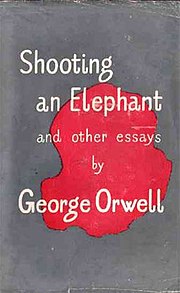Shooting an Elephant
| "Shooting an Elephant" | |
|---|---|

Cover of first anthology publication
|
|
| Author | George Orwell |
| Country | United Kingdom |
| Genre(s) | Unknown whether fiction or non-fiction |
| Published in | New Writing |
| Publication date | 1936 |
"Shooting an Elephant" is an essay by George Orwell, first published in the literary magazine New Writing in late 1936 and broadcast by the BBC Home Service on 12 October 1948.
The essay describes the experience of the English narrator, possibly Orwell himself, called upon to shoot an aggressive elephant while working as a police officer in Burma. Because the locals expect him to do the job, he does so against his better judgment, his anguish increased by the elephant's slow and painful death. The story is regarded as a metaphor for British imperialism, and for Orwell's view that "when the white man turns tyrant it is his own freedom that he destroys."
Orwell spent some of his life in Burma in a position akin to that of the narrator, but the degree to which his account is autobiographical is disputed, with no conclusive evidence to prove it to be fact or fiction. After Orwell's death in 1950, the essay was republished several times, including in Shooting an Elephant and Other Essays (1950), Inside the Whale and Other Essays (1957), and Selected Writings (1958).
Britain conquered Burma over a period of 62 years (1823–1886), during which three Anglo-Burmese wars took place, and incorporated it into its Indian Empire. It was administered as a province of India until 1937, when it became a separate, self-governing colony, attaining its independence on January 4, 1948. With a strong interest in the lives of the working class, Orwell—born in India to a middle-class family, but brought up in Britain—held the post of assistant superintendent in the British Indian Imperial Police in Burma from 1922 to 1927.
"Moulmein used to be full of elephants..." [employed to] haul logs in the timber firms. "Ordinary tamed elephants have been part of Burmese life for centuries,...the rare and revered white elephant, is believed in Buddhist legend to be a symbol of purity and power." By the time Orwell moved to Moulmein, in 1926, "...he was most probably ambivalent about the colonial state of which he was a part. The Kipling-inspired romance of the Raj had been worn thin by the daily realities of his job in which,...he witnessed 'the dirty work of Empire at close quarters'." Orwell writes how he was trapped between his own resentment towards the Empire and the Burmese people's resentment towards him. As a member of the ruling power, he is cornered into doing what the "natives" expect of him: "He wears a mask, and his face grows to fit it." "
...
Wikipedia
